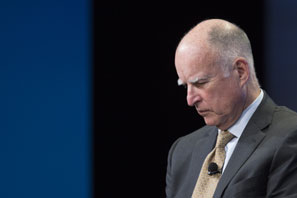
During California’s 2015 legislative session, which recently ended, a small cadre of Republicans demonstrated once again the value of preventing Democrats from holding two-thirds of the seats in each house. GOP lawmakers held the line against tax hikes pushed by the majority Democrats and Governor Jerry Brown. The call for tax increases, which require two-thirds of the legislature to pass, came despite a $10 billion windfall in unexpected tax revenues.
In the session’s manic final days, Republicans also joined with moderate Democrats to cut out the worst part of Senate Bill 350, which would have mandated a 50 percent cut in gasoline consumption in the state by 2030. The bill was the work of senate president pro tem Kevin de León, the Los Angeles Democrat who spent $50,000 last year on an inauguration party for himself. If it had passed, SB 350 would have guaranteed sharply higher gas prices, with many of de León’s low-income constituents hardest hit.
Finally, a reason to check your email.
Sign up for our free newsletter today.
Naturally, the governor blamed impersonal corporate forces for the defeat. “Oil has won a skirmish,” Brown said. “But they lost a bigger battle, because I am more determined than ever to make our regulatory regime work for the people of California.” Yet it’s unlikely moderate legislators will change their positions during an election year. By 2017, Brown will be a lame duck with two years left in his final term.
On September 14, Brown also warned that failure to take drastic measures against fossil-fuel consumption would have geopolitical consequences. “What we’ve [seen] in Europe now with mass migrations, that will happen in California, as . . . Central America and Mexico, as they warm, people are going to get on the move.” Considering that California makes up just 2 percent of the world’s economy, cutting gasoline use in half—if such a thing were even possible—wouldn’t produce so much as a ripple in the global climate. And that’s assuming Brown is correct about the climate’s imminent apocalypse.
Unfortunately, other elements of SB 350 remain mostly intact. It mandates that 50 percent of electricity must come from renewable sources by 2030, up from the current 33 percent standard by 2020 that Brown signed into law four years ago. The bill also requires “a cumulative doubling of statewide energy efficiency savings in electricity and natural gas final end uses of retail customers” by 2030, as determined by the State Energy Resources Conservation and Development Commission.
Another de León bill, SB 185, is a sop to anti-carbon-energy fanatics like hedge-fund manager Tom Steyer, who is heavily invested in the renewable-energy sector. The bill would prohibit the California Public Employees’ Retirement System and the California State Teachers’ Retirement System, the nation’s two largest public-employee pension funds, “from making new or additional investments of public employee retirement funds in thermal coal companies.” Fifteen years ago, state treasurer Phil Angelides, a Democrat and failed gubernatorial candidate, pushed the pension funds to divest their holdings in tobacco companies. As Steven Malanga noted, “Depressed at the time, those shares soon began to rise; a 2008 CalSTRS report estimated that the funds missed $1 billion in profits because of the divestiture.” Whatever may happen with coal stocks isn’t as important as the additional restrictions SB 185 would place on state pension-fund managers’ freedom to judge which investment strategies are best for maximizing equity. Ultimately, any losses that CalPERS and CalSTRS sustain must be borne by the taxpayers.
California legislators’ penchant for “boutique legislation” was on display with Santa Monica Democrat Richard Bloom’s Assembly Bill 888. The bill would ban “the sale of personal care products that contain plastic microbeads” in 2020 because the beads can be swallowed by fish and fauna. Bloom’s legislation is part of a global “Beat the Microbead” movement. Microbeads largely are used in cosmetics. If Brown signs the bill into law, don’t be surprised if a grey market in contraband cosmetics springs up in Hollywood.
One of the last bills that the legislature considered was among the worst. ABX2-15, sponsored by Assemblywoman Susan Talamantes Eggman, would allow physician-assisted suicide for the terminally ill. A nearly identical bill was withdrawn over the summer when its sponsors couldn’t persuade enough Democrats to vote for it, despite crucial support from some powerful members of the state’s medical industry. Eggman, a Stockton Democrat, revived the bill during a special session devoted to Medi-Cal, the state’s version of Medicaid, and Brown signed it Monday. Whatever one thinks of legalizing physician-assisted suicide—and critics insist it is likely to be widely abused—it’s no small irony that lawmakers would pass such a bill as part of their effort to shore up a bloated entitlement.